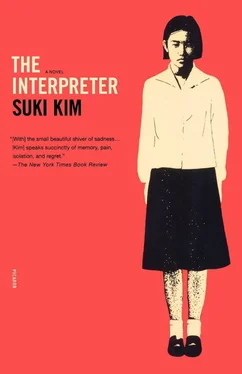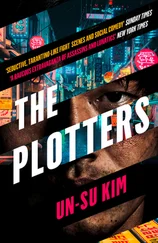It wasn’t that the fact-checking job was necessarily boring. Suzy didn’t mind reading the copy all day. She could pretend that her cubicle was a waiting room at a doctor’s office or an airport lounge as she scanned articles about the President’s latest run-ins with that big-haired intern, or Philip Roth’s ex-wife’s tell-all book about Philip Roth, or the usual groundbreaking news, most of which she forgot instantly. Every day she had to call the New York Public Library and ask them to verify the year of publication of The Bell Jar or The Crying of Lot 49 or the exact number of literary texts mentioned in Harold Bloom’s monstrous canon book. The line was always busy, and she had to keep redialing. She thought it was kind of a miracle, that someone somewhere across the city was looking up all the gritty facts for her, as if it mattered to anyone, except Mr. Bloom, whether the magazine should print 100 texts or 101. What she did mind, and could not stand, in fact, was the voice of the researcher who came on the phone in the third month. It was a new person; by then, Suzy could recognize all voices on the other end. There was a shy, whispery girl-voice that answered in the morning, which Suzy imagined might actually belong to a tall woman in her fifties with wavy silver hair and a pleated skirt. Another was a husky male who often answered during lunchtime, whose intonation of words like “chiaroscuro” and “serendipitous” made Suzy swallow hard before saying thank you. But the new voice was without much character: monotone, matter-of-fact, flat. Suzy cringed when he answered, and was not sure why. She would forget the question and mumble whatever came into her mind, or, worse, she would hang up instantly. But it bothered her, this ominous voice she had to hear every day, almost every hour on busy days. Finally, in her fourth month, she quit. She did not explain why, and she was never asked. Fact-checkers are a dime a dozen. They come and go. Some get real jobs at the women’s magazines around town, and a few actually sell the novel they’ve been slaving away at for years. But most move back home to Wichita or Baltimore, swearing never to return to New York. Jen laughed when Suzy told her later and said, “Damian, he must’ve been some fuck.” Sure, something about the researcher’s dark drone reminded her of Damian, but that was almost an afterthought.
Interpreting, Suzy finds, is somehow simpler, freer to be exact. The agency calls her when there is a job, and she shows up wherever the deposition happens to take place. Most cases are banal: automobile accidents, slip-and-falls, medical malpractice, basically any misfortune that might generate cash. The details are almost always predictable. The plaintiff wasn’t really hurt at the time of the accident, but now, six months later, cannot move his head. Or the plaintiff had surgery and is now suffering from complications. Suzy never finds out what happens to these cases, whether they actually end up in trial or settle out of court or lead to another set of depositions. Her job is just to show up and translate into English verbatim what the witness testifies in Korean. She often feels like the buxom communication officer in Star Trek , the one who repeats exactly what the computer says. Except Suzy’s role is neither so fleshy nor so comical. The contract, which the agency made her sign, included a clause never to engage in small talk with witnesses. The interpreter is always hired by the law firm on the side opposing the witness. It is they who need the testimony translated. The witness, summoned to testify without any knowledge of English, inevitably views the interpreter as his savior. But the interpreter, as much as her heart might commiserate with her fellow native speaker, is always working for the other side. It is this idiosyncrasy Suzy likes. Both sides need her desperately, but she, in fact, belongs to neither. One of the job requirements was no involvement: Shut up and get the work done. That’s fine with her.
Except it doesn’t go as smoothly as that. Suzy often finds herself cheating. Sometimes the witness falters and reveals devastating, self-incriminating information. The opposing counsel might ask how much he makes a week, and the witness turns to Suzy and asks what he should say. Should he tell him five hundred dollars, although he usually makes more money on the side? Suzy knows that the immigrant life follows different rules—no taxes, no benefits, sometimes not even Social Security or green cards. And she also knows that he should never tell lawyers that. So she might fudge the answer. She might turn to the lawyer innocently and translate, “My income is private information; approximately five hundred dollars, I would say, but I cannot be exact.” Or the opposing side might try to make a case out of the fact that the plaintiff, when struck by a car, told the police that he was feeling fine and refused an ambulance. “Surely,” the lawyer insists, “the injury must not have been severe if you even refused medical attention!” But Suzy knows that it is a cultural misunderstanding. It is the Korean way always to underplay the situation, to declare one is fine even when suffering from pain or ravenous hunger. This might stem from their Confucian or even Buddhist tradition, but the lawyers don’t care about that. “Why did you say you were fine at the time of the accident if you weren’t? Were you lying then, or are you lying now?” the lawyer presses once more, and Suzy winces, decides that she hates him. The witness gets all nervous and stammers something about how he’s not a liar, and Suzy puts on a steel face to hide her anger and translates, “I was in shock, and the pain was not obvious to me until I got home and collapsed.” Then the lawyer looks stumped and moves on to the next question. Suzy knows it is wrong, to embellish truth according to how she sees fit. In fact, she will be fired on the spot if anyone discovers that her translation harbors a bias. But truth, she has learned, comes in different shades, different languages at times, and lawyers with a propensity for Suzy Wong movies may not always see that. The job comes naturally to her. Neither of her parents had spoken much English. Interpreting is almost a habit.
Suddenly a light tap on her right shoulder. Suzy turns around to find a man standing there. It is the Korean man from McDonald’s, the one with the freshly polished shoes, with a tired wife and unreachable daughters. “Mr. Kim?” She is delighted at such a coincidence. Breaking into a shy smile, he nods. He looks meek and timid now, no longer the grave man sitting across from her buried in his newspaper. “ An-nyung-ha-sae-yo .” She makes a slight bow, the way Koreans do when addressing the elderly. Then he stares at Suzy’s face intently, as he had done earlier this morning, and says in the unfamiliar midregional Korean accent, “You remind me of someone I used to know, a good woman, too young to be killed like that.” Before she can ask what he means, the stenographer and two lawyers charge in as if they have been hanging outside together the whole time. “Shit, a ticket.” The older lawyer shakes his head, waving a piece of paper. The younger one frowns, trying to appear sympathetic. The stenographer ignores both and adjusts the paper into her machine with the efficiency of a pro, turning to Suzy.
“Raise your right hand. Do you solemnly swear that you will translate from Korean to English and from English to Korean to the best of your ability, so help you God?”
“I do,” Suzy answers, thinking to herself, Yes, please help me, God .
On the way home, Suzy calls Jen from Grand Central, which is just a few blocks from Jen’s office.
“Do they always let you out this early?” Jen smiles when she greets Suzy at the Starbucks counter in the north wing of the station, sipping a Frappuccino. She is impressed that Suzy has stuck with interpreting for eight months, but she also makes it clear that she is not fooled.
Читать дальше












